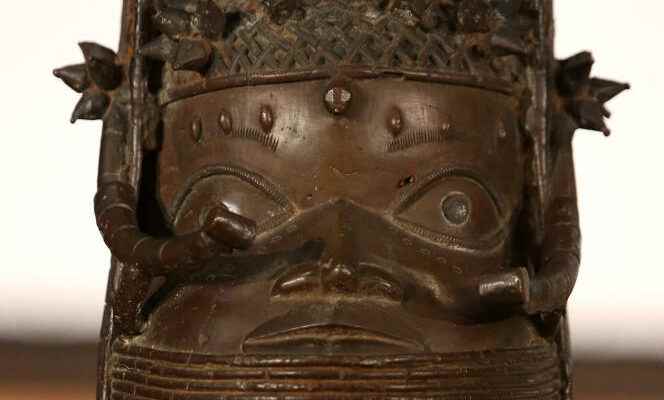Stolen during the colonial era, they will be exhibited from Saturday September 17 in Berlin before being returned to Nigeria: the Benin bronzes and their tumultuous history testify to Germany’s progressive awareness of the injustices of the past. They are among the most famous works of African art.
Two thrones, a commemorative head of a king that once adorned the palace in Benin City, the former capital of the Kingdom of Benin (southern Nigeria), are among the items on display at the Humboldt Forum, a museum complex in the heart of historic Berlin. Some will soon leave for Africa.
Two rooms, accessible to the public from this weekend, are devoted to the art and history of the Kingdom of Benin in “close collaboration with Nigerian partners”, according to the German authorities. The transfer of ownership is explained and educational workshops are also scheduled.
The Benin bronzes were scattered in several European museums after being looted by the British at the end of the 19th century.e century. “The recognition of colonial injustice and the restitutions that flow from it as well as the many new avenues of cooperation and co-production will continue to define our work in the future”promised Herman Parzinger, president of the Prussian Cultural Heritage Foundation, which oversees Berlin museums, in a press release.
“Clear Look at the Past”
This initiative is part of a series of measures taken recently by Germany to try to assume the crimes of the colonial period, such as the official recognition in May 2021 of a genocide perpetrated in Namibia. “Like the Netherlands and Belgium, Germany has implemented museum policies with a lucid look at the colonial past”believes Pascal Blanchard, French historian, specialist in “colonial fact” and immigration to France, in an interview with AFP.
Thus, the large museum dedicated to Africa in Tervuren, near Brussels, reopened at the end of 2018 after renovation, claims a ” critically “ on this past and the history of the objects collected under the King of the Belgians Leopold II, who for a long time managed the Congo as his private property at the end of the 19th centurye century. Similarly, the Tropenmuseum in Amsterdam looks at the country’s colonial heritage.
Unlike France and its community of pied-noirs in Algeria, Germany, which lost its colonial empire after its defeat in the First World War, does not count in its population of repatriates from Africa. “There is no political weight, which makes it easier to understand the story”observes Mr. Blanchard.
A museum in Benin City
Nevertheless, Germany, like other Western countries, has had to face criticism in recent years about the provenance of the objects kept in its museums, in the wake of movements against racism. And these criticisms have been exacerbated by the opening in December 2020 of the first part of the Humboldt Forum museum complex, housed in the reconstructed former palace of the sovereigns of Prussia. In this highly symbolic place, the main residence of the Hohenzollerns, initiators of German colonialism, it was planned to exhibit colonial objects.
Currently, the Ethnological Museum of Berlin has 530 historical objects from the former kingdom of Benin, including 440 bronzes, considered the most important collection after the British Museum in London. According to its director, Lars-Christian Koch, part will soon be returned, a third will remain there in the form of loans for ten years and the rest of the objects, not exhibited, will be studied by researchers.
The German restitutions echo similar steps taken by other European countries, such as France which returned in November 2021 to Benin, a neighboring country of Nigeria, 26 works from the royal treasures of Abomey (south). And they increase the pressure on the British Museum, which holds some 700 bronzes.
For the French historian Bénédicte Savoy, these returns come very late: “African demands for restitution date back to the independence of these countries in the 1960s. For years they were stifled, refused, forgotten. » Nigeria plans to build a museum in Benin City in southern Edo State to house the recovered works.
To not miss any African news, subscribe to the newsletter of the “World Africa” from this link. Every Saturday at 6 a.m., find a week of news and debates covered by the editorial staff of the “World Africa”.
